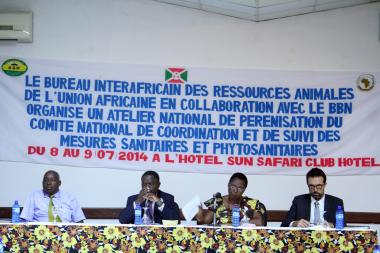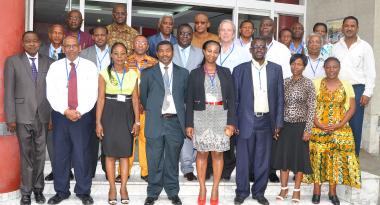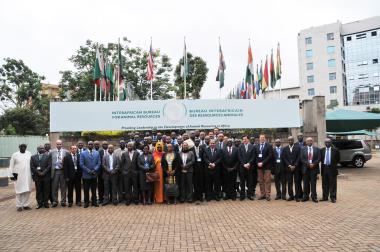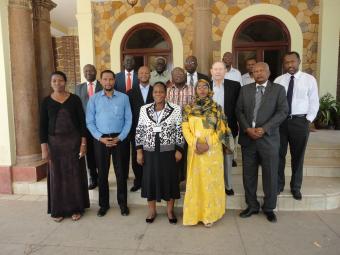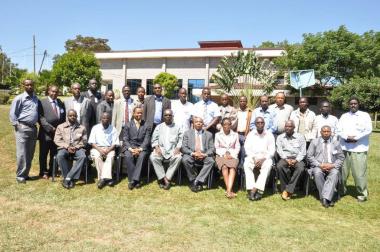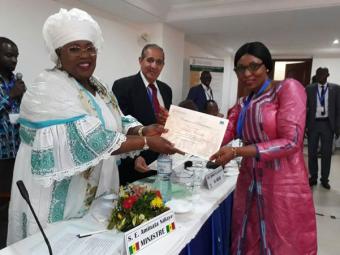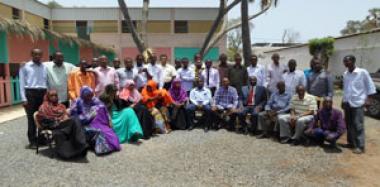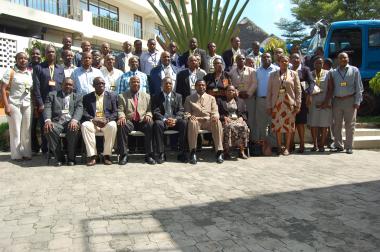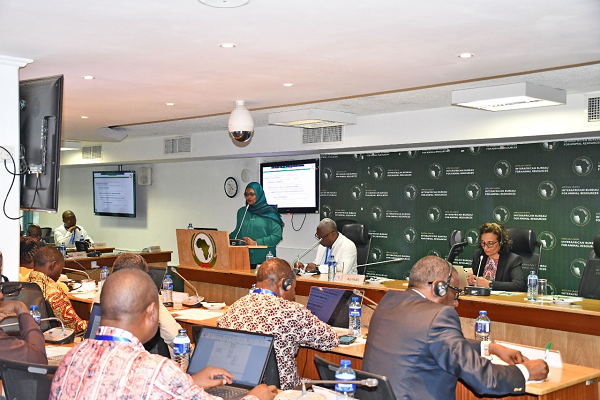
Nairobi, May 16, 2024 – In a meeting organised by AU-IBAR, key stakeholders have gathered to discuss critical issues such as sustainable livestock transformation, One Health and disease control, inter-regional dialogue, and strategic information sharing within the African livestock sector. The event of about sixty delegates features speakers and attendees, including Chief Veterinary Officers (CVOs) from across the continent, representatives from the Food and Agriculture Organisation (FAO), various experts in animal health and welfare, and AU-IBAR staff.
Opening Remarks: A Vision for Livestock Development
AU-IBAR Director, Dr. Huyam Salih opened the meeting by focusing on strategic animal health priorities essential for the sector's advancement. She emphasized the importance of partnerships and announced a new collaboration with WOAH and FAO under the Global Framework for the Progressive Control of Transboundary Animal Diseases (GF-TADs) Africa. This partnership aims to tackle significant animal health challenges, enhancing disease control and promoting a One Health approach that recognizes the interconnectedness of human, animal, and environmental health.
“We are committed to transforming Africa's livestock sector through strategic investments, robust partnerships, and a shared vision for sustainable development,” Dr. Salih noted.
Dr. Huyam Salih, further underscored the critical role that livestock plays in Africa’s food and nutrition security, livelihoods, and socioeconomic development. She emphasized the need for robust investment and infrastructure to unlock the sector's full potential, which has been hampered by persistent challenges such as inadequate funding, weak animal health service delivery systems, and the emergence of new diseases. Dr. Salih highlighted AU-IBAR’s leading role in implementing the Livestock Development Strategy for Africa (LiDeSA) 2015-2035, a comprehensive roadmap designed to stimulate investments and guide the long-term development of the livestock sector.
“The health of our livestock is intrinsically linked to our own health, our economies, and our future. Today, we aim to foster open discussions on workforce development, disease eradication, and the enhancement of our animal health systems,” stated Dr. Salih.
Mr. Thanawat Tiensin, Director of Animal Production at FAO, expressed his enthusiasm for the collaborative efforts underway. He reflects on the global livestock landscape's changes and acknowledges the crucial support provided by pandemic funds to four countries, with expectations of extending this support further. Mr. Tiensin reiterated the significance of the April 19th, 2024, 33rd FAO Regional Conference for Africa, where livestock development is a focal point.
“Addressing food insecurity and promoting economic growth through sustainable livestock development are paramount. Our continuous efforts, including upcoming forums like the FAO Global Conference on Animal Health Innovation, are geared towards creating a better environment and nutrition for African people,” says Mr. Tiensin.
Agenda Highlights and Key Initiatives
The session’s agenda is packed with discussions on sustainable livestock transformation, workforce development, disease eradication, and enhancing animal health systems. Key highlights include:
Sustainable Livestock Transformation: Madhur Dhingra from the FAO discussed sustainable livestock practices and One Health (OH) strategies in Africa. He emphasized the importance of integrating OH approaches to tackle issues like antimicrobial resistance (AMR) and diseases such as rabies. The presentation highlighted FAO's support for African nations in implementing OH strategies and sustainable livestock management. Dhingra stressed the need for investment in pandemic preparedness and response to build resilience in African agriculture and livestock sectors.
Learning and Development: FAO provided updates on the development of veterinary paraprofessionals and enhancing primary animal health services. The creation of seven virtual learning centres offering 22 courses across Africa was highlighted, aiming to standardize curricula and facilitate continuous learning and strengthening Communities of Practice. Inservice applied veterinary epidemiology trainings were also elaborated.
Disease Eradication and One Health: AU-IBAR presented initiatives targeting the eradication of Peste des Petits Ruminants (PPR), animal health and welfare, including one health; enhancing aquatic animal health, and ensuring biosecurity. The Animal Welfare Strategy for Africa (AWSA) and the Animal Health Strategy for Africa (AHSA) were discussed as comprehensive frameworks addressing these challenges.
Vaccine Quality and Certification: AU-PANVAC discussed their support in animal disease control through the registration and certification of veterinary vaccines and manufacturing facilities.
Animal Health Systems: On the agenda, you may find updates on the work that the FAO is doing to improve the animal health system. This includes things like strengthening lab capacity development in Africa, improving disaster planning and response capacities, bolstering national early warning, surveillance, and information systems for animal health, biosecurity, and One Health. In addition to discussing the Global PPR eradication programme (GEP), the discussion goes over the latest updates and obstacles in controlling key transboundary animal illnesses such as HPAI, RVF, FMD, and CBPP.
Updates on Rabies Coordination, One Health, and Antimicrobial Resistance: Coordination concerns with rabies in accordance with the worldwide strategy, updates on One Health (OH) and antimicrobial resistance (AMR), including measures to halt the development and spread of AMR in Africa, the OH partnership, support for the pandemic fund and the OH investment plan, were key issues on the agenda.
Insights and Future Directions
Discussions so far point to a unified agreement among participants on the increasing demand for animal-source foods and the essential role of livestock in meeting this demand. Participants emphasized the importance of harmonizing processes at the country level and coordinating with all sectors to ensure the livestock sector's contributions are recognized and optimized. The hybrid nature of the meeting allows for extensive participation and collaboration, paving the way for actionable strategies that promise to elevate the continent's livestock sector to new heights.

